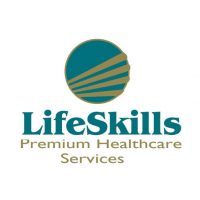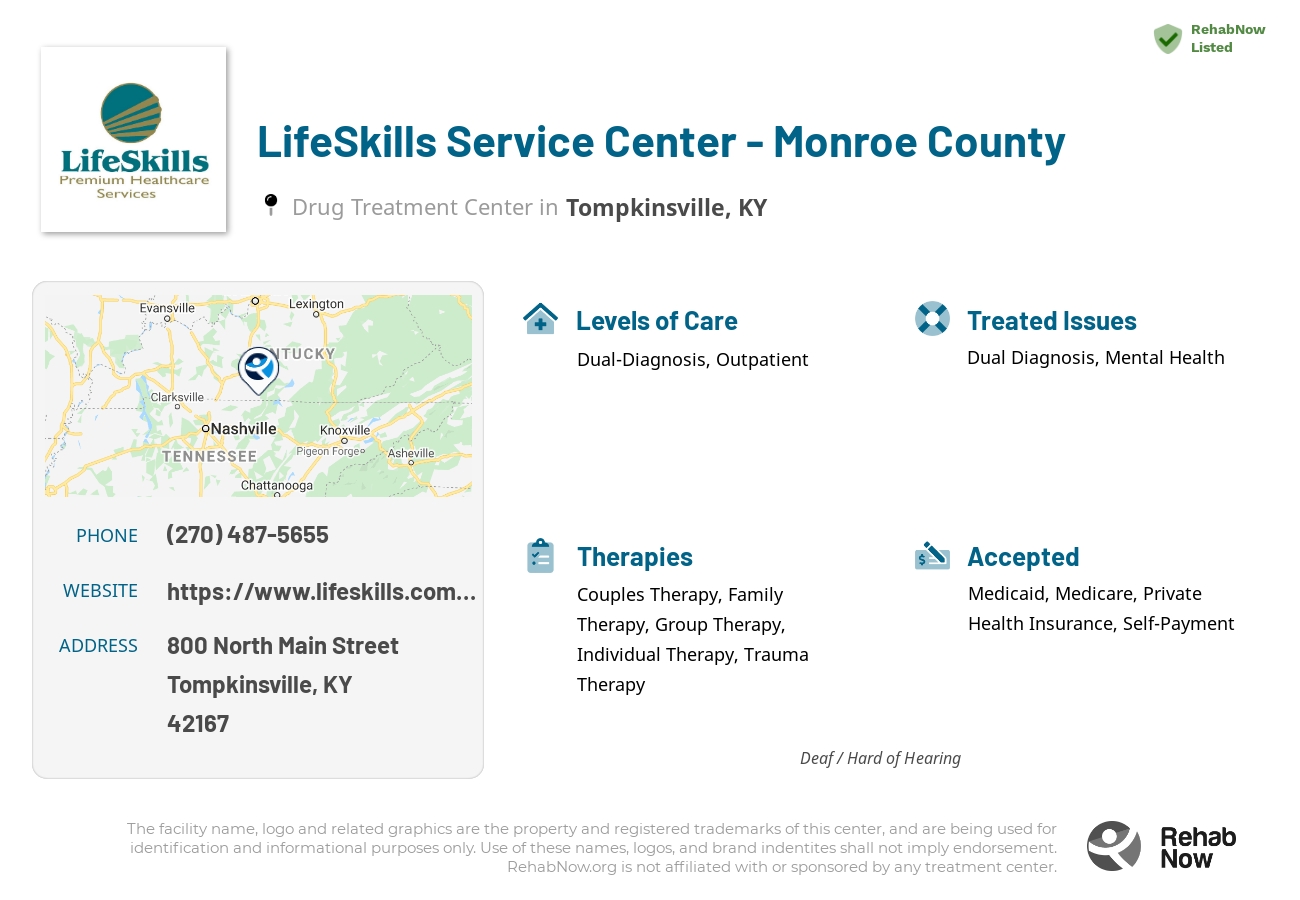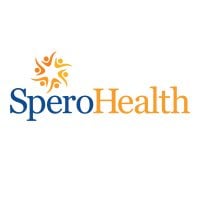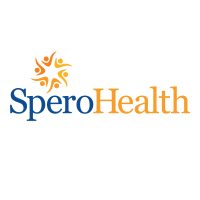LifeSkills Service Center - Monroe County
Drug Rehab Center in Tompkinsville, Kentucky
LifeSkills Service Center in Tompkinsville, Kentucky offers comprehensive treatment for Dual Diagnosis, Mental Health, Drug Addiction, Opioid Addiction, and Alcoholism, providing various levels of care and accepting private health insurance.
About This Kentucky Facility
LifeSkills Service Center – Monroe County in Tompkinsville, Kentucky offers treatment for people suffering from Dual Diagnosis, Mental Health, Drug Addiction, Opioid Addiction, and Alcoholism. They provide comprehensive and integrated services including Dual-Diagnosis, Outpatient, Detox, Aftercare Support, and Inpatient levels of care. To ensure the highest quality of care, services are provided in accordance with state-licensed standards and accreditation. LifeSkills Service Center – Monroe County accepts private health insurance to ensure their services are more accessible to everyone.
The center offers essential services to help individuals with addiction and substance abuse issues. Dual-Diagnosis treatment is tailored to the needs of the person, involving an integrated approach to treat the underlying cause of addiction. Outpatient treatment is available for those who need an intense yet flexible program of recovery. Detoxification is available for those needing immediate help in order to begin their recovery journey. Aftercare Support helps keep individuals on track after completing treatment, while Inpatient Levels of Care provide intensive services with 24-hour support. These services, combined with important accreditation and licensing from the State, make LifeSkills Service Center – Monroe County a reliable resource for those battling addiction and substance abuse issues.
Genders
Ages
Modality
Additional
Accreditations
State License
Conditions and Issues Treated
Dual Diagnosis refers to someone who is both dealing with addiction and another mental health issue.
There are different kinds of Dual Diagnosis: A person who simultaneously experiences both a mental illness and an addiction disorder. Or, a person who experiences one or more coexisting (simultaneous) mental health conditions in addition to a primary substance use disorder.
Some conditions that commonly co-occur with addiction include:
- Personality Disorders (Borderline, Narcissistic)
- Mood Disorders (Bipolar Disorder, Depression, Anxiety Disorder)
- PTSD (Post Traumatic Stress Disorder), OCD (Obsessive Compulsive Disorder), ADHD (Attention Deficit Hyperactivity Disorder)
- Schizophrenia, Psychosis, Hallucinations, Delusions
Levels of Care Offered at LifeSkills Service Center - Monroe County
This center offers a variety of custom treatment tailored to individual recovery. Currently available are Dual-Diagnosis, Outpatient, with additional therapies available as listed below.
Outpatient treatment programs provide drug and alcohol addiction treatment through individual sessions with a counselor, group therapy, 12-step meetings, and other activities to help individuals gain sober living skills. Most programs are designed for those individuals who have completed a medically supervised detoxification program and provide opportunities for clients to begin the process of early recovery.
Outpatient programs also offer a level of medical support as needed and psychological backing through therapy. Clients are encouraged to live at home, though there may be some flexibility regarding this requirement based on the circumstances and needs of each patient.
Outpatient treatment is perhaps the most common type of dual diagnosis program available. It does not pose a significant financial burden on patients. However, it is essential to note that outpatient treatment does not provide the support and supervision given in residential programs. Some addicts may need this level of support to maintain their sobriety.
Therapies & Programs
Therapy sessions focused on the individual addict can provide much-needed guidance as they work toward overcoming their addiction. These types of sessions typically involve guidance from a therapist, who will help addicts identify and process their feelings and cravings.
During these sessions, addicts may develop plans for coping with the triggers that typically lead to relapse and learn how to avoid those triggers during their recovery process.
If you are looking for drug recovery, couples therapy can be a great option. This type of therapy can help rebuild trust and joy in relationships that may have been damaged by addiction. It can also help reduce the dysfunctional behavior in a relationship that may trigger addiction. A patient’s partner will be involved in the process. They can also benefit from therapy, especially if they are trying to live with an addict.
The main goal of family therapy for drug addiction is to create an environment where communication can occur without judgment, hostility, or blame that often occurs within a family.
Family therapy is a type of group problem-solving that aims to improve communication and relationships between the patient, their family, and sometimes friends. The therapist is with the family as they learn to communicate with each other differently, especially with the addict when s/he is using.
The family can learn to reduce their enabling behavior or rally together and support each other during tough times. The patient also learns how to deal with their addiction and maintain sobriety while interacting with the family.
Different types of addiction treatment services are available. Within this article, group therapy is of interest due to its high success rate compared to individual therapy. Group therapy settings are beneficial because they allow recovering addicts to build a strong support network.
Benefits of group therapy are:
- Reduces feelings of isolation
- Immediate access to social support in the form of fellow addicts in recovery
- Lowers risk of relapse
- Increases rate of sobriety
- Builds coping skills that can be applied to everyday life
Trauma Therapy is a form of therapy that involves working with a patient to help them process and understand the past trauma(s) in their life. The idea behind it is that while some people can experience traumatic events and not have lasting psychiatric symptoms, many others will. In these cases, memories of the event get hidden from consciousness but continue to influence how the person processes and copes with things in their life. They may avoid situations that resemble what happened or become suddenly angry or irritated to a situation that reminds them of a past event.
With the help of a therapist, people can go back over memories and experiences. This helps them understand why they are having problems coping with certain situations and how they can change how they think and react to things. This therapy is typically done using techniques such as visualization, discussion, and writing down thoughts and feelings.
Trauma therapists will work with clients to help them understand their past and present relationships. Many times, patients may believe that something is inherently wrong with them or that they are unworthy of love. A therapist aims to correct these negative feelings and behaviors by helping the person realize that their actions do not reflect who they truly are.
One of the main goals of trauma therapy is to help clients express their emotions and talk about what they are feeling. This benefits both to increase awareness of how certain events have impacted them in the past and enables patients to realize that they can make changes in their lives.
Cognitive Behavioral Therapy (CBT) is used by drug treatment centers to help addicts comprehend the causes of their substance abuse and the consequences that follow. Through CBT, clients learn to recognize and avoid high-risk situations and cope with challenging situations when they arise.
CBT treatment often includes a combination of individual therapy, group therapy, lectures, and other activities. The treatment’s goal is to help addicts gain self-control and maintain abstinence from drugs and alcohol over the long term so that an addict can get sober and lead a more productive life.
CBT is particularly effective in helping people overcome their drug problems, especially people whose drug abuse is motivated by self-defeating beliefs and emotions.
Payment Options Accepted
For specific insurance or payment methods please contact us.
Is your insurance accepted?
Ask an expert, call (888) 674-0062
LifeSkills Associated Centers
Discover treatment facilities under the same provider.
- LifeSkills - Edmonson County Office in Brownsville, KY
- LifeSkills - Monroe County in Tompkinsville, KY
- LifeSkills - Barren County Office in Glasgow, KY
- LifeSkills Service Center and Friendship Clubhouse - Barren County in Glasgow, KY
- LifeSkills - Simpson County Office in Franklin, KY
Learn More About LifeSkills Centers
Additional Details
Specifics, location, and helpful extra information.
Tompkinsville, Kentucky 42167 Phone Number(270) 487-5655 Meta DetailsUpdated November 25, 2023
Staff Verified
Patient Reviews
There are no reviews yet. Be the first one to write one.
Tompkinsville, Kentucky Addiction Information
Kentucky ranks among the top ten states for opioid-related overdoses. Most of these are due to heroin, fentanyl, and prescription opioid use. A little over 11% of the Kentucky population abuses alcohol in a given year. More than 15% of Kentucky adults admit to participating in binge drinking every month.
Treatment in Nearby Cities
- Asheville, KY (98.9 mi.)
- Danville, KY (82.2 mi.)
- Versailles, KY (106.9 mi.)
- Harlan, KY (131.4 mi.)
- Russell Springs, KY (41.0 mi.)
Centers near LifeSkills Service Center - Monroe County
The facility name, logo and brand are the property and registered trademarks of LifeSkills Service Center - Monroe County, and are being used for identification and informational purposes only. Use of these names, logos and brands shall not imply endorsement. RehabNow.org is not affiliated with or sponsored by LifeSkills Service Center - Monroe County.









